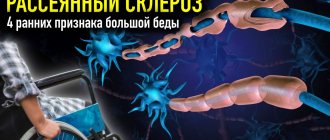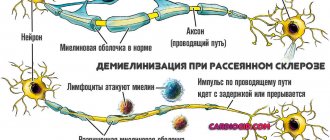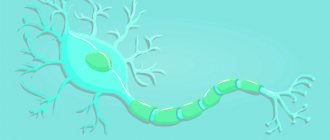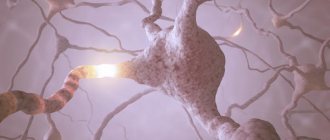Multiple sclerosis (MS) is a neurodegenerative disease in which the immune system destroys the body's own nerve tissue. Vitamin D in multiple sclerosis plays an important role in reducing the frequency of relapses and relieving symptoms. Recent studies have established a cause-and-effect relationship between low levels of cholecalciferol (vitamin D3) and the development of multiple sclerosis.
Large randomized trials have also found a strong association between high ergocalciferol intake at a young age and later onset of MS. High levels of vitamin D during adolescence reduced the risk of developing MS by 84-97%.
In multiple sclerosis, areas of myelin destruction occur
Impact of the Coimbra Protocol on autoimmune diseases
Why does vitamin D help with autoimmune diseases?
Dr. Coimbra: Vitamin D is the largest regulator of the immune system and modifies the function of thousands of genes in every cell of the immune system. It is a substance for which there is no comparable other substance.
I'll make a comparison to explain what I mean when I say that so many genes are regulated by vitamin D in their activities: Imagine making a high-rise building with a lot of rooms. Imagine that thousands of doors in this skyscraper can be opened or closed with only one key. Compare this skyscraper of the immune system and the key is vitamin D.
When a person is deficient in vitamin D, it can no longer regulate the thousands of biological functions in immune system cells that are supposed to function, and a lack of this one substance can spell disaster for the immune system!
This is why people with vitamin D deficiency are susceptible to many autoimmune diseases, such as multiple sclerosis, autoimmune polyneuropathy, Guillain-Barre syndrome, rheumatoid arthritis, psoriatic arthritis (and psoriasis itself), myasthenia gravis, polymyositis and systemic lupus erythematosus - just to name a few. diseases from a large number.
What exactly does vitamin D do in the immune system?
Dr. Coimbra: Vitamin D is a modulator, an immunomodulatory substance that does not suppress the activity of the immune system as a whole, but modulates it. And we know that vitamin D specifically suppresses the immunological response that causes autoimmune diseases. This is called a "Th17 response." Almost all autoimmune diseases are caused by this abnormal response rather than a physiological one.
What is this Th17 reaction?
Dr. Coimbra: The Th17 response is caused by the overproduction of an immune messenger substance or cytokine called Interleukin 17. Interleukin-17 production is a natural occurrence and is beneficial in certain quantities. However, overproduction of this substance is not a natural phenomenon. And vitamin D regulates the production of interleukin-17.
And how does this TH17 reaction get out of control? Vitamin D deficiency?
Dr. Coimbra: Patients with autoimmune diseases have a genetically inherited resistance to the effects of vitamin D. This resistance to the immunomodulatory effects of vitamin D is partial resistance, not complete resistance. Because of this resistance, these people are predisposed to developing autoimmune diseases.
What does vitamin D resistance mean? How to imagine this?
Dr. Coimbra: The exact mechanism of this resistance is not yet clear. There are already several known diseases associated with various genetic mutations of the vitamin D receptor, which make these people resistant to vitamin D. Such resistance may also be due to changes in the enzymes responsible for converting and activating vitamin D, the two hydroxylases.
Is this your hypothesis or is there evidence for this?
Dr. Coimbra: This is not just a hypothesis, this is certain: polymorphic changes in one of the two vitamin D hydroxylases (especially 1-alpha hydroxylase) or the vitamin D receptor or DBP (vitamin D binding protein) have been reported in several cases, have been identified and published studies related to autoimmune diseases.
The number of people with autoimmune diseases is increasing - does this mean these mutations are spreading?
Dr. Coimbra: Not necessarily, but the impact of genetically modified vitamin D metabolism on multiple diseases, not just autoimmune diseases, has worsened in recent years, possibly due to avoidance of sun exposure and overuse of sunscreen. This leads to a high prevalence of vitamin D deficiency, which increases the prevalence of autoimmune diseases. These people will require significantly more vitamin D.
And what determines what type of autoimmune disease a patient develops from this resistance?
Dr. Coimbra: There are several factors that may preferentially target an autoimmune response to a specific tissue, organ, or system. One factor is the inherited function of the immune system, such as the histocompatibility system, the so-called “HLA genotype.” Another factor may be infectious diseases, which attack the immune system in a variety of ways.
Does resistance to vitamin D inevitably lead to autoimmune diseases?
Dr. Coimbra: Some people have a genetic predisposition to autoimmune diseases but have not yet developed autoimmunity. We believe that in addition to this genetic predisposition, something else is needed to cause these diseases. The most common, I would say probably ubiquitous, triggering factor - at least in relapsing MS (we found almost no exceptions among thousands of patients with autoimmune diseases) - is a stressful life event or prolonged stress and fatigue. This seems to be the case for most autoimmune diseases.
I firmly believe that the increasing prevalence of autoimmune diseases is mainly due to three factors: first, inherited partial resistance to the biological effects of vitamin D. Second, vitamin D deficiency caused by low sun exposure. And thirdly, the emotional factor, the triggering factor that leads to the activation of autoimmune diseases in people who have two other predisposing factors.
Do you think there are many other factors currently influencing autoimmune diseases?
Dr. Coimbra: We do not exclude that other factors may also play a role in this process, but even if these factors may indeed contribute to the development of autoimmune diseases, the role they play is likely to be secondary to the pathophysiological importance of vitamin D .
Until now, you have primarily treated patients with MS. What is the success rate of the protocol in multiple sclerosis?
Dr. Coimbra: About 95% of patients with MS remain in permanent remission according to our protocol. While patients receive high doses of vitamin D, the disease remains inactive, with no signs of new lesions, either clinical or laboratory. About 5% of patients achieve partial response, meaning they have improvement but do not achieve complete remission.
We are exploring the reasons why this 5% do not receive a complete response from MS. So far we see five main points: The most important is high stress levels. Emotional stress can seriously affect the outcome of this treatment. Other elements that affect the success of this therapy are smoking, frequent drinking of alcohol, habit of taking hot baths and recurrent infections - usually in the urinary tract. This is almost independent of vitamin D, since these factors in general can accelerate the development of MS, even in patients undergoing conventional treatment.
How many patients are treated according to your protocol?
Dr. Coimbra: Personally, I have already treated over 1,600 patients with MS and a similar number of patients with other autoimmune diseases. Five other doctors have been working under our supervision since 2013 in our clinic, treating an even larger number of patients with autoimmune diseases. There are now about 100 doctors around the world that I have trained who use our protocol, so the total number of patients must be in the tens of thousands.
It's a great experience! You also treat many other autoimmune diseases such as psoriasis, vitiligo, Crohn's disease... Are the treatment results equally good for all these diseases?
Dr. Coimbra: Our protocol is a very effective treatment for all the autoimmune diseases we have looked at so far. In all these diseases we have achieved complete control of the disease.
The use of vitamin D in the treatment of autoimmune diseases is not aimed at a specific disease, but at regulating the immune system as a whole. Under the influence of vitamin D, the immune system increases the number of so-called “regulatory T cells,” which regulate the immune response. At the same time, the abnormal Th17 response is selectively inhibited by vitamin D. These two things are extremely important for controlling any autoimmune disease.
Thus, autoimmune diseases such as chronic inflammatory bowel disease, Crohn's disease and ulcerative colitis are all cases that we have treated with complete success. The patient lives without any manifestations or symptoms of the disease and leads a normal life. The same goes for psoriasis and vitiligo - again, we have a 95% success rate for complete resolution of symptoms.
There are slight differences in neurological disorders. We have successfully treated isolated optic neuritis, Guillain-Barré syndrome (GBS), autoimmune polyneuropathy and myasthenia gravis, and again, in 95% of cases we were able to achieve complete suppression of autoimmune activity. But unfortunately, this does not mean that old, long-term and irreversible damage caused by the immune system automatically disappears.
Unfortunately, paraplegia that has been present for many years in a patient with MS or long-term joint deformity in a patient with rheumatoid arthritis cannot be reversed. All other symptoms of disease activity such as inflammation, chronic fatigue, pain, swelling, redness, and all newly acquired disorders can be resolved. In general, any problems that appeared one year before starting treatment can almost completely regress with high doses of vitamin D.
Multiple sclerosis. What it is?
There is no 100% opinion about the cause of the disease in textbooks. But there is numerous scientific data confirming the possibility of the participation of a virus of the herpes family in the formation of a deadly disease - multiple sclerosis. Why it causes minor disturbances in some people, while destroying the lives of others, can only be explained by the varying degrees of readiness of the immune system for attack.
A weakened person reacts more strongly and the course of his disease is more severe. Reasons for weakened immunity may include the presence of sluggish intoxication (toxic microelements), chronic stress, poor nutrition, overwork with hard work, climate change and time zones, etc.
The disease can be provoked by a slow-acting viral infection, which leads to immune restructuring of the body. This is a so-called autoimmune reaction: the immune system begins to produce antibodies that attack its own nerves.
In multiple sclerosis, the sheath of nerve fibers is destroyed, resulting in disruption of the conduction of nerve impulses to all organs. as a result, some functions disappear: for example, visual impairment occurs in the form of a decrease in the acuity and clarity of perception; impaired sensitivity of certain areas of the skin and mucous membranes;
the appearance of muscle cramps, grand mal seizures, impaired muscle contraction due to their excessive weakness or, conversely, painful hypertonicity. Often there is stool and urine incontinence, lack of sensitivity of the genital organs with the development of frigidity and impotence; from the mental side - depression or, conversely, unmotivated euphoria. All symptoms of this disease are not permanent. The disease occurs with exacerbations and remissions.
Coimbra Protocol: Vitamin D for Multiple Sclerosis?
The traditional treatment strategy for multiple sclerosis does not lead to a cure, but, in successful cases, to an alleviation of symptoms. During an exacerbation, the patient takes cortisone drugs in high doses, as well as medications that inhibit cell growth and division (cytostatics, which are also prescribed to cancer patients as part of chemotherapy).
In addition, medications are prescribed for individual symptoms (antidepressants, analgesics, etc.). In the long term, attempts are being made, on the one hand, to strengthen the immune system with the help of certain medications, and on the other hand, to slow down its functioning. It is known that not all medications used for multiple sclerosis have convincingly proven effectiveness.
Some of them can only be taken for two to five years over a lifetime, otherwise they can cause life-threatening conditions. Another standard anti-MS drug (interferon beta-1a) is suspected of increasing the risk of cancer. Certain drugs can cause inflammation of the brain.
In addition, interferon beta-1a can cause depression, and then antidepressants are immediately prescribed. These drugs, in turn, have long lists of side effects, for which, of course, there are also medications...
The relationship between vitamin D and multiple sclerosis has been studied for a long time. Dr. Coimbra from Brazil claims that multiple sclerosis is now treatable. Professor Coimbra and his team have successfully treated thousands of patients with multiple sclerosis, in many cases with complete normalization of all symptoms and clinical parameters. His treatment method, popularly called the “Coimbra Protocol,” is based largely on one element: a high dose of vitamin D.
If treatment begins on time, the results can be amazing: practically blind people begin to see again, people sitting in wheelchairs begin to walk again. We spoke with Dr. Coimbra about the importance of vitamin D in autoimmune diseases.
Dr. Coimbra, how did you come up with the idea of using vitamin D to treat MS and other autoimmune diseases?
Dr. Coimbra: I conducted research on laboratory rats, modeling neurological diseases in order to test new diagnostic capabilities. In the process, I found a huge number of published studies that, strangely enough, were invariably ignored in medical textbooks.
I wondered why this information was not used in clinical practice, when in fact some of this research was a very important basis for prevention and treatment. Gradually, I became personally convinced that a large number of patients would benefit from various ideas that were not described at medical conventions or in textbooks, since they could reduce the sales of expensive drugs. At some point I was completely convinced of this.
Are these studies not widely known in the medical community?
Dr. Coimbra: This information is still not available in popular textbooks, and most doctors are not aware of the importance of the hormone we call vitamin D. So we started giving vitamin D to patients suffering from neurodegenerative diseases. My first experience was with patients suffering from Parkinson's, and I began to treat them with vitamin D in physiological doses.
What do you mean by "physiological dose"?
Dr. Coimbra: The daily dose currently recommended internationally is a negligible dose, well below the required physiological dose. The physiological dose has recently been demonstrated to be 10,000 IU for adults with normal body mass index. The same amount can be produced by the body in just 10-20 minutes of sun exposure, depending on the level of exposure to the body surface, body position (lying or standing), skin pigmentation, age, sun position.
Thus, 10,000 IU is a physiological dose and not a superdose. But most doctors still consider this dose potentially toxic. Today, the officially recommended dose is still 600 IU, although this figure has been proven to be incorrect. 600 international units are recommended, but if a person is exposed to the sun for just 20 minutes, they can easily produce 10,000 units! This is a clear discrepancy between medical practice and the current state of scientific knowledge.
So your dose was 10,000 IU?
Dr. Coimbra: Yes. So we started giving 10,000 units to people with neurodegenerative diseases. One day, a patient with Parkinson's disease came for a second visit, after 3 months of taking 10,000 IU daily, and this patient had a vitiligo lesion on his face that had improved significantly after several months of taking 10,000 IU.
Impressed by this initial result, I began giving 10,000 units of vitamin D to patients with multiple sclerosis. MS is a very common autoimmune disease in neurology with very devastating consequences. This first daily dose has also been given for other autoimmune diseases such as psoriasis, lupus erythematosus, rheumatoid arthritis.
Benefits of Vitamins, Herbs and Supplements for Multiple Sclerosis
Although multiple sclerosis is essentially incurable, vitamins, herbs and supplements slow its progression in a variety of ways. They enhance the antioxidant protection of the nervous system from free radicals, weaken inflammatory processes occurring in the brain, and stimulate the synthesis of fatty acids and other substances necessary for the formation of myelin.
| Recommended Vitamins, Herbs, and Supplements for Multiple Sclerosis | |
| Vitamin C/Vitamin E | Dose: 500 mg of vitamin C and 250 mg of vitamin E 2 times a day. Note: Vitamin C enhances the effect of vitamin E; If diarrhea occurs, reduce the dose of vitamin C. |
| Vitamins B | Dose: 1 tablet per day. Directions: choose a complex containing 50 mcg of B12 and biotin, 400 mcg of folic acid and 50 mg of all other vitamins in this group in 1 tablet. |
| Vitamin B12 | Dose: 100 mcg 3 times a day. Directions: Preferably taken in the form of methylcobalamin. |
| Fish fat | Dose: 2 teaspoons per day (2 g omega-3 fatty acids). Caution: Consult your doctor if you are taking anticoagulants. |
| Oslinnik oil | Dose: 1000 mg 3 times a day. Directions: You can replace 1000 mg of borage oil once a day. |
| Ginkgo biloba | Dose: 40 mg extract 3 times daily. Directions: Use an extract containing at least 24% flavone glycosides. |
| Note: Use the drugs in red font first. Check to see if you are getting the same substances from different supplements. Attention! If you are being treated with medications, take any supplements only with your doctor's approval. | |
Vitamins C and E help with multiple sclerosis because they are strong antioxidants.
| Vegetarians can take flaxseed as a source of essential fatty acids that protect nerves. |
B vitamins (including supplemental B12) are important for the formation of nerve tissue and its protection from damage. In addition, according to some data, in multiple sclerosis, B12 levels are reduced, possibly due to a deterioration in its intestinal absorption.
The omega-3 fatty acids in fish oil and aspen oil have anti-inflammatory properties and also promote the formation of healthy nerve tissue in the long term.
St. John's wort (300 mg extract 3 times a day), oats, ginger and ginkgo biloba help against multiple sclerosis.
| For your information |
| For a patient with multiple sclerosis, psychological support and a family environment are very important. Occupational therapy and physical therapy are also recommended. |
How much is needed?
The recommended daily requirement for vitamin B12 is 1 to 3 micrograms per day. And usually a person gets enough of it with food. But modern products are processed and stored for a long time, which reduces the usefulness of food. In addition, vegetarianism, fasting, and diets also do not contribute to the production of vitamin B12. Alcoholism and smoking worsen the situation.
B12, as a fat-soluble vitamin, can accumulate in the body. Even with a lack of vitamin, its noticeable deficiency will develop only after 3–4 years. The shortage will most quickly manifest itself in autoimmune diseases and intestinal absorption disorders.
Why can you use natural remedies?
1. Support the immune system so that it prevents the proliferation of viruses and at the same time nourish the nervous system to allow the membranes of nerve cells to recover.
2. Restore nutrition to nerve cells, improve the structure of the myelin sheath, transmission of nerve impulses
We have a case where a patient with multiple sclerosis received such a stable remission that he decided to get married! Several people diagnosed with multiple sclerosis have been regularly taking higher basidal mushrooms (Meishi) for 8 years and are fully functional and leading normal lives. The course of the disease can be stabilized so much that there is no exacerbation for many years!
In severe cases, when there is already impaired function of the legs or arms and the person with multiple sclerosis is lying down, taking natural remedies has the goal of inhibiting damage to nerve cells. Depending on the level of protective forces, an exacerbation of multiple sclerosis may be stronger or weaker. Against the background of complete health, with sufficient immunity, the level of vitamins, microelements, and enzymes, no one gets multiple sclerosis.
You can select a set of natural remedies for multiple sclerosis only if you understand physiology and have experience. There are no folk remedies for multiple sclerosis.
Therefore, please get advice on the correct use of the Sokolinsky System.
We guarantee 100% authenticity of the natural products we have. If you have a serious illness, you should not experiment with purchasing medications from unverified online stores and distributors.
This disease is treated by a doctor. But he is engaged in treatment according to the textbook. The consultant’s task is to tell you how to influence the cause of multiple sclerosis (weakening of your body) and help restore the damaged myelin sheath of the nerves, ensure normal nutrition of the nervous tissue and its protection from damage.
To get a confident effect in this disease, you need to start with the basics: first cleanse the body through normalizing the functioning of the intestines and liver, and then saturate the nervous tissue with nutrients (lecithin, B vitamins, amino acids) for a long period, and at the same time correct the immune system.
It is also ideal to make sure that there are no toxic effects on the immune system and nervous system (get tested for microelements). Because manganese, lead, mercury, and arsenic can aggravate the disease and interfere with treatment of multiple sclerosis.
Some people see results already in the first month, but as a rule the course takes 3 months. The speed depends on the natural rate of cell renewal. Although, if the manifestations are minor, then strengthening the body with natural means may even help stop the exacerbation. In any case, multiple sclerosis is too serious a disease for there to be any help from “mints and peppers” or “miracle pills.” What is needed is a system. Get advice on how to properly use the Sokolinsky System for multiple sclerosis.
Meishi (export version)
The natural product Meishi (export version) contains specially processed shiitake and meitake mushrooms. This has long been used in multiple sclerosis as a means for self-regulation of antiviral immunity. The idea of using any means that affect the immune system for this disease is based on research into the possible causes of the disease.
The active components of Meishi are the polysaccharide lentinan and perforin, as well as the D-fraction. Their task is to teach the immune system to break through the shell of the viral cell and also to stimulate the T-cell component of immunity. Read more about the scientific basis for using Meishi and its effect on the immune system.
How to take Meishi for multiple sclerosis. Take Meishi 1 capsule 2 times a day. The course is at least 2 months in a row. Then a 1 week break. Take this for six months
Buy Meishi with a guarantee of authenticity
Lecithin for multiple sclerosis
One of the most necessary for overcoming the symptoms of multiple sclerosis. It is lecithin that is part of the membranes of nerve cells. In addition, lecithin is a precursor of acetylcholine, an important neurotransmitter - a substance without which the transmission of nerve impulses is impossible. A deficiency of this substance in this disease entails irritability, increased fatigue, deterioration of memory and ability to concentrate, insomnia, impaired liver function, and impaired muscle tone. Lecithin also helps cleanse blood vessels from cholesterol.
Another natural remedy is produced specifically for the Sokolinsky System - LecithinUM. Its feature is a more affordable price, since it is “our own” and not American.
There is an even more active form of lecithin, although more expensive - Neurolecithin. It has an increased content of the active substance - phosphatedylserine. Neurolecithin has a huge effect on brain function and prevents the destruction of brain structures.
In the Sokolinsky System, we recommend regular soy lecithin and neurolecithin together for this disease to obtain a greater supporting effect at lower costs.
It works both at the level of the brain and spinal cord, where demyelination occurs in multiple sclerosis.
Buy Neurolecithin with a guarantee of authenticity
Buy LecithinUM with a guarantee
Vita-B-plas (strong complex of B vitamins) for multiple sclerosis
B vitamins are needed in cases where the body as a whole or its individual organs and tissues need increased amounts of energy, especially during this disease.
Traditionally, B vitamins are prescribed for neurological diseases, to normalize the functioning of the nervous system.
For the first time, this complex from the American company Vitalain contains the optimal dosage of all B vitamins. This ensures real results when taken. It is very difficult to obtain an equally natural digestible complex in a regular pharmacy.
Buy Vita B plus with a guarantee of authenticity
Acetyl-L-carnitine for multiple sclerosis
An amino acid that has a unique effect on nervous tissue. Not to be confused with carnitine, which is used for weight loss and heart muscle support.
Acetyl-L-carnitine is necessary for energy production in nerve cells and the synthesis of acetylcholine, the main transmitter of excitation in the nervous system. Acetyl-L-carnitine improves signaling between neurons, protects neurons from harmful influences and promotes the growth of new neurons in multiple sclerosis.
You can take this amino acid simply to protect against stress and during active mental work. It is not a stimulant, but only protects nerve cells from damage. But in case of multiple sclerosis, Acetyl-L-carnitine is simply included in the “Sokolinsky System”
Buy Acetyl-L-Carnitine with Guaranteed Authenticity
At the Sokolinsky Center in Prague, we also use Curcumin Q10 complex, which we have recently actively recommended for use in programs for multiple sclerosis. The mechanism of action of this high-tech turmeric extract has been well researched. It has a positive effect on the immune system and anti-inflammatory mechanisms, and is a strong antioxidant that protects cells from damage.
In addition, you can use natural B vitamins to support immune mechanisms, just as we use Meishi in Russia, in European practice - Mycostress and Mycocomplex immunocomplex, which include rare herbs and mushroom polysaccharides.
B12 and its dosage
Vitamin B12 deserves special mention.
It is itself a component of myelin, and its deficiency causes symptoms similar to those of MS. The best way to take B12 is considered to be intravenous, since more than 95% of the substance is absorbed, while when taken orally, the bioavailability of the drug is slightly more than 70%.
It should be taken 1000 mcg daily for the first week, then weekly for 6 weeks, and then monthly for six months. If you improve, you can continue to inject once every three months.
Excess vitamin B12 can cause the following side effects:
- thrombosis;
- allergies;
- hives;
- pulmonary edema;
- heart failure.
Taking B12 is dangerous if:
- tendency to thrombosis;
- lactation;
- angina pectoris;
- varicose veins and hemorrhoids;
- oncological diseases;
- taking corticosteroid hormones;
- treatment for tuberculosis.
- what diet should be followed and why, what exercises the patient needs;
- do they take you into the army with this diagnosis, do they give you disability;
- what needs to be done to prevent exacerbations of the disease;
- what is the treatment method for MS with a bone marrow transplant;
- Are folk remedies applicable in the treatment of the disease?
New study finds vitamin D prevents exacerbations of MS
Thus, the situation with the treatment of multiple sclerosis cannot be called satisfactory. A new study conducted at the University of Toronto on the effect of vitamin D on the course and development of multiple sclerosis inspires hope.
Patients with MS who took very high doses of vitamin D in the study (an average of 14,000 IU per day, 1 IU is the international unit equivalent to 0.025 micrograms of vitamin D3) were successfully prevented from further flare-ups of the disease. In addition, their body functions did not weaken, and no negative side effects were noticed.
Researchers warn about the dangers of high doses of vitamin D
Despite these very promising results, doctors do not recommend that MS patients take more than 4,000 IU of vitamin D, as high-dose therapy is considered unsafe. However, at the same time, the same study found that taking only 4000 IU per day had no effect on the course of multiple sclerosis.
In addition, it has been proven many times that vitamin D in high doses is completely safe. Even the University of Toronto, as part of a study on vitamin D, officially stated that there was “no evidence indicating a negative effect from taking 10,000 IU of vitamin D daily.” It is generally accepted that chronic overdose is possible only when taking 40,000 IU in drug form over several months.
The drug Cladribine
| Type of drugs: | Properties: | Tablets for multiple sclerosis: |
| Nootropic |
|
|
| To strengthen the walls of blood vessels |
| |
| Psychostimulants |
| |
| Vitamins |
|
|
| Antidepressants |
| |
| Tranquilizers |
|
To restore vascular function and memory, folk remedies are used for elderly patients. The following folk “medicines” are effective as a complement to the main treatment:
- garlic and garlic oil;
- heather;
- honey with onions;
- Red clover;
- elecampane;
- rowan bark.
The drug Cladribine can reduce the process of destruction of the nerve sheath and slow down the development of the disease. It is available in tablets, which will greatly facilitate treatment for patients due to its convenient release form.
The effectiveness of the drug Cladribine was confirmed as a result of a long-term experiment, in which hundreds of patients with multiple sclerosis took part.
Despite the proven effectiveness of the drug against the progression of sclerosis, Cladribine causes a number of dangerous side effects. Today, you cannot buy the drug in a pharmacy, as research is still ongoing.
Sunbathing guarantees the body's supply of vitamin D
Nevertheless, warnings of this kind, of course, cause skepticism. But vitamin D does not have to be taken in tablets. Since the human body can independently produce this vitamin when exposed to sunlight, it is enough to expose your skin to the sun every day. This way you can get enough vitamin D completely free of charge without any risk of overdose.
This means: put on your swimming trunks or swimsuit and go sunbathe. If it's too cool outside for such clothing, just make sure that as much of your skin as possible is exposed to direct sunlight.
If a fair-skinned person is exposed to the sun until their skin turns pinkish, this equates to taking approximately 20,000 IU of vitamin D. Thus, our body produces an incredibly large amount of vitamin D in the shortest possible time - and never before. There have been no reports of vitamin D overdose due to excess sunlight.
No less interesting is the fact that the closer to the equator, the less common multiple sclerosis is. On this basis, some scientists conclude that multiple sclerosis can develop as a result of chronic vitamin D deficiency - simply because in the north people expose their skin to the sun much less often, which means their body practically cannot produce vitamin D.
However, the diet in developed northern countries today contains very little of this vitamin. For example, Greenlandic Eskimos, despite the constant lack of sunlight, have optimal vitamin D levels, since they eat freshly caught or even dried fish and its offal every day.
Those who live in the south, closer to the equator, wear shorts and sandals most of the year, and they - even without fish and offal in their diet - do not have to worry for a second about supplying their body with vitamin D.
For people in developed countries in Central Europe, this means deliberately and regularly exposing their skin to natural sunlight whenever possible.
Instructions for use
The recommended daily allowance for vitamin B12 is 2.4 mcg per day for adults, but many experts recommend taking 100-400 mcg. Elderly people and vegans (those who do not consume meat products) especially need vitamin B12.
Vitamin B12 deficiency: Symptoms of vitamin B12 deficiency in the body include fatigue, depression, numbness and tingling in the extremities caused by nerve damage, muscle weakness, confusion and memory loss. Dementia and pernicious anemia may develop; both diseases are reversible with timely diagnosis. With age, the level of vitamin B12 in the blood decreases. People at risk include people with ulcers, Crohn's disease and other gastrointestinal diseases, as well as those taking medications for seizures, chronic heartburn and gout. Alcohol abuse also interferes with the absorption of vitamin B12.
Excess vitamin B12: Excess vitamin B12 is easily excreted from the body in urine, so even in large quantities this vitamin does not have a negative effect on the body.
Dosage: 1000 mcg of vitamin B12 per day is beneficial in preventing heart disease, pernicious anemia, numbness, tingling, tinnitus, multiple sclerosis and rosacea. If there is a lack of vitamin, the dosage may be increased. If your body does not produce enough intrinsic factor, injections or a nasal spray may be required. Consult your doctor.
Directions for use: Take vitamin B12 once daily, preferably in the morning, along with folic acid (at least 400 mcg). Most multivitamins contain the recommended daily allowance of vitamin B12 and folic acid; in special vitamin B12 complexes their content is higher. If larger therapeutic dosages are required, look for products that contain only vitamin B12 or B12 and folic acid. For better absorption, it is recommended to place the tablet under the tongue.
The main sources of vitamin B12 are animal products, such as organ meats, brewer's yeast, oysters, sardines and other types of fish, eggs, meat and cheese. Some brands of breakfast cereals are fortified with this vitamin.
Along with vitamin B12, it is necessary to take medications containing folic acid. Large doses of one may mask a deficiency of the other.
The higher the level of vitamin D in the blood, the lower the risk of multiple sclerosis
As early as 2006, the Journal of the American Medical Association (JAMA 2006; 296: 2832-2838) published a study that found a link between blood levels of vitamin D and multiple sclerosis.
Dr. Cassandra Munger of the Harvard Institutes of Health and colleagues selected 257 multiple sclerosis patients from a database of seven million patients who had at least two blood samples obtained approximately five years before the onset of the disease.
Vitamin D levels in these samples were compared with those in healthy controls. It turned out that the higher the level of vitamin D, the lower the risk of developing multiple sclerosis (in people with white skin color).
How to determine?
Vitamin B12 deficiency can be suspected if there is anemia, in which a person, in addition to weakness, dizziness, and tinnitus, has a lack of hemoglobin in the blood. The most common neurological signs are paresthesia - goosebumps and tingling. Sometimes relatives of an elderly person notice his irritability and memory impairment. This is the only manifestation of B12 deficiency.
Previously, B12 deficiency was determined by a general blood test, when a decrease in hemoglobin content in red blood cells was detected. Measurement of total vitamin B12 in serum is currently used. To diagnose hypovitaminosis, special test systems have appeared that allow you to record the level of active vitamin B12, which is precisely a marker of deficiency.











